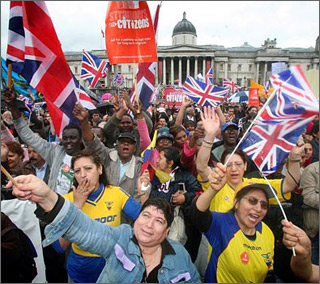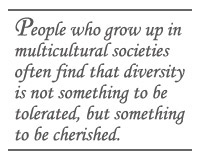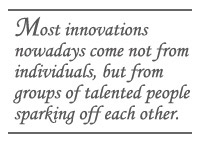Cosmopolitan Masala: Diversity Enriches Us All
Cosmopolitan Masala: Diversity Enriches Us All

boosts diversity which leads to innovation
LONDON: For all the carping about globalization, the diversity that it has brought about in the world’s most cosmopolitan cities offers tangible benefits – for personal development, communities and the economy as a whole. Immigration has been a major force behind this blossoming diversity.
Diversity broadens the range of cultural experiences available in a city or country. As a Londoner, I’m delighted that local restaurants now serve food from around the world, rather than just the awful British stuff we once had to put up with. The mingling of cultures through immigration leads to distinctive innovations. Chicken tikka masala is now said to be Britain’s national dish, while Pacific fusion cuisine may be Australia’s. People are tempted by new holistic therapies that blend Eastern and Western influences and enjoy the work of writers of mixed heritage such as Salman Rushdie and filmmakers such as Ang Lee.

Coming into contact with different types of people, different points of view, different ways of thinking and different lifestyles helps us understand our own culture and the world around us better, to grasp the values and assumptions that underpin them, and hopefully progress as individuals and as societies.
Post-war immigration highlighted the racism prevalent in Western societies and inaugurated a long battle to combat discrimination. Conversely, the debate about forced marriages and genital mutilation has exposed the limits of cultural relativism and strengthened many people’s belief in asserting the importance of values such as the equality of men and women. And people who have grown up in multicultural societies often find it not only normal but desirable to live with people of different backgrounds, with diversity not something to be tolerated, but something to be cherished. Diversity opens up a whole new set of possibilities for friendship, as well as love, as the increasing number of mixed-race and mixed-culture relationships shows.
For people who appreciate cultural diversity and want to live in tolerant, open societies, the cosmopolitan vibrancy of cities like London and New York is a big attraction. Diversity thus acts as a magnet for talent, which in turn spurs economic growth. In “The Rise of the Creative Class,” Richard Florida documents how “regional economic growth is powered by creative people, who prefer places that are diverse, tolerant and open to new ideas.”

Two Italian economists, Gianmarco Ottaviano and Giovanni Peri, have attempted to estimate the economic value of cultural diversity by examining wages and rents in US cities with varying shares of foreign-born residents. When they looked at data from 160 US cities between 1970 and 1990, they found that the average wages earned by US-born people and the average rent they paid were much higher in cities that are more culturally diverse. The higher wages suggest that productivity is higher in culturally diverse cities, while the higher rents suggest that people are willing to pay more to live in cities that offer a variety of people and cultural experiences. Their findings stand up to a battery of statistical tests that measure whether the link might just be a spurious coincidence or reverse causality.
The biggest economic benefit of diversity is that it stimulates new ideas, which are the source of most economic growth, which in turn pays for the good schools, hospitals and other public goods that we value.
The exceptional individuals who come up with brilliant new ideas often are immigrants. Instead of following the conventional wisdom, immigrants tend to have a different point of view and notice new details. As outsiders, they are more determined to succeed. Of Britain’s Nobel-prize winners, 21 arrived in the country as refugees.
Most innovations nowadays come not from individuals, but from groups of talented people sparking off each other – and foreigners with different ideas, perspectives and experiences add something extra to the mix. If there are 10 people sitting around a table trying to come up with a solution to a problem and they all think alike, then they are no better than one. But if they all think differently and bounce new ideas and reactions off one another, they can solve problems better and faster, as a growing volume of research shows.
A list of America’s Nobel prize-winners shows many composed of teams of US-born and foreign-born talent. In fact, as Scott Page explains in “The Difference: How the Power of Diversity Creates Better Groups, Firms, Schools,” a diverse team of talented individuals is actually better at solving problems than a group of likeminded geniuses.

Just look at Silicon Valley: Google, Yahoo!, eBay and many other big names of the internet revolution were co-founded by immigrants. In fact, nearly half of America’s venture-capital-funded start-ups were co-founded by immigrants. And founders like Sergey Brin of Google, Jerry Yang of Yahoo! and Pierre Omidyar of eBay arrived in the US not as highly-skilled immigrants, but as children.
US universities also attract the world’s top graduate students in science and engineering, and studies show that an increase in the number of foreign students not only raises patents granted to universities, it also gives a big boost to patents granted to businesses, as foreign graduates who stay on in the US add to the productivity of the wider economy.
Diversity is not only vital in high-tech industries; it’s crucial in all sorts of important sectors, because an ever-increasing share of advanced economies’ prosperity comes from companies that solve problems, whether they are developing new medicines, new computer games or new environmentally-friendly technologies, designing innovative products and policies, or providing original management advice.
When countries are technologically backward, they can make huge leaps forward simply by copying what more advanced economies are doing. They may then benefit from being culturally uniform, since this makes it easier for everyone to move forward in unison. Likewise, in periods when economic change is slow, more homogeneous countries may find it easier to organize themselves efficiently than more heterogeneous ones. But in advanced economies, during periods of rapid economic change such as now, the value of diversity and the creativity it spurs comes into its own.
That's why the old recipe for economic growth – more spending on education, extra investment in research and development – is not good enough any more. If we already knew how to develop tomorrow’s technologies, they’d be yesterday’s technologies. Millions of hours and millions of dollars can be spent trying to solve a problem without finding a solution; but add someone with a fresh pair of eyes and a different perspective and suddenly an answer emerges.

As John Stuart Mill remarked back in 1848: “It is hardly possible to overrate the value, for the improvement of human beings, of things which bring them into contact with persons dissimilar to themselves, and with modes of thought and action unlike those with which they are familiar… there is no nation which does not need to borrow from others.”
The bottom line is this: Since diversity boosts innovation and innovation is the source of most economic growth, critics who claim that immigration has few or no economic benefits are profoundly mistaken. Immigration makes for a richer life in every sense.
A British economist and journalist, Philippe Legrain has served as special adviser to the director-general of the World Trade Organization and worked as trade and economics correspondent for the Economist. His latest book is “Immigrants: Your Country Needs Them. Click here to read an excerpt from his book.